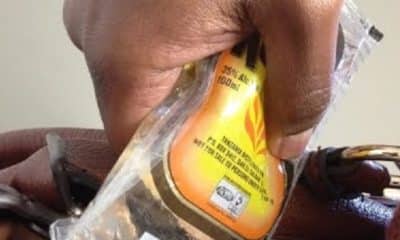Nigeria News
Calcium Carbide: NAFDAC Gives Fresh Warning On Types Of Fruits To Consume

The National Agency for Food and Drug Administration and Control (NAFDAC) has issued a fresh warning to Nigerians concerning the consumption of calcium carbide ripened fruits in the country.
Naija News reports that the Director General of NAFDAC, Prof. Moji Adeyeye, in her keynote address, at the flag-off of the NAFDAC Media Sensitization Workshop on Dangers of Drug Hawking and Ripening of Fruits with Calcium Carbide, cautioned Nigerians on the consumption of such fruits.
According to her, the dangerous practice of artificially causing fruits to ripen with calcium carbide has continued to endanger the health of people in the country.
She said consuming fruits containing these impurities over time may cause cancer, heart, kidney, and liver failure, among others.
Adeyeye noted that the practice had become another public health challenge in the country while stating that “Ripening is a unique aspect of plant development, which makes the fruit edible, softer, sweeter, more palatable, nutritious, and attractive.
“People should desist from patronizing fruits ripened with calcium carbide so they don’t endanger their health.
“Fruits provide the body with micronutrients that improve immunity and prevent diseases, among other benefits. Fruit ripening is a unique aspect of plant development, which makes the fruit edible, softer, sweeter, more palatable, nutritious, and attractive.
“However, consuming fruits such as mango, banana, plantain, guava, orange, grape, etc., or any other fruits ripened with calcium carbide is dangerous to health.”
Listing possible effects of fruits with the artificial ripening dangerous agents, the NAFDAC said they include “considerable loss of properties such as color, taste and feel, and such practice does not give the natural aroma and flavor to the fruits.
“These fruits do not possess uniform color, are less juicy than when ripened naturally, and have a comparatively shorter shelf life. Calcium Carbide, when sprayed with water, reacts chemically to produce acetylene, which acts like ethylene and ripens fruits by a similar process. Calcium carbide generally contains impurities such as arsenic, lead particles, phosphorus, etc., that pose several very serious health hazards.
“Consumption of fruits containing these impurities may cause cancer, heart, kidney, and liver failure. They may also cause frequent thirst, irritation in the mouth and nose, weakness, permanent skin damage, difficulty in swallowing, vomiting, skin ulcer, and so forth.Higher exposure may cause undesired lung fluid build-up (pulmonary edema).
“Acetylene produced by Calcium Carbide affects the neurological system, reduces oxygen supply to the brain, and further induces prolonged hypoxia.
“The impurities are hazardous to pregnant women and children and may lead to headache, dizziness, mood disturbances, mental confusion, memory loss, cerebral edema (swelling in the brain caused by excessive fluids), sleepiness, seizure, etc.
“Calcium Carbide is alkaline in nature and erodes the mucosal tissue in the abdominal region and disrupts intestinal functions.
“Consuming such artificially ripened fruits could result in sleeping disorders, mouth ulcers, skin rashes, kidney problems, and possibly even cancer.
“Other symptoms of poisoning include diarrhea (with or without blood), burning or tingling sensation in abdomen and chest, difficulty in swallowing, irritation in eyes/skin, sore throat, cough, shortness in breathing, numbness, etc.”
Speaking further, Adeyeye submitted that “NAFDAC has commissioned a scientific study on the best approach towards mitigating the health hazards posed by ripening of fruits with carbides.
“I have mandated some of my directors and support staff to take these campaigns to the nooks and crannies of this country.
“We are confident of winning the war against these two hydra-headed public health menaces.
“It is, therefore, a great pleasure for me to declare open this Media Sensitization Workshop while urging you to assist NAFDAC in publicizing and disseminating the knowledge acquired to the general public.”











